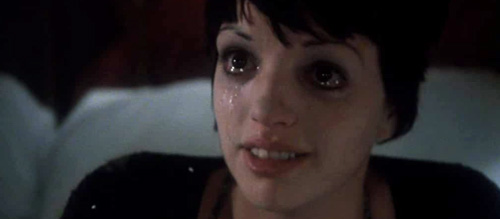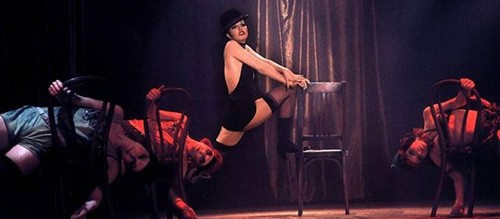‘Cabaret’ at 50 – Review

Cabaret (1972)
Director: Bob Fosse
Screenwriter: Jay Allen
Starring: Liza Minnelli, Michael York, Joel Grey, Helmut Griem, Fritz Wepper, Marisa Berenson, Elisabeth Neumann-Viertel, Helen Vita
When it first made its debut on stage in the late 1960s, ‘Cabaret’ was (historically-rooted subject matter aside) very much like other musicals in its style. That changed with famed choreographer Bob Fosse’s Liza Minnelli-starring film adaptation and the revolutionary decision to confine its musical sequences to the stage and thereby introduce an element of realism to the most unreal of film genres. 50 years on, has this iconic Oscar winner stood the test of time? Leave your troubles outside as we explore this. Willkommen…
1931, Berlin. Struggling American singer at the seedy Kit Kat Klub, Sally Bowles (Liza Minnelli), meets the equally struggling gay English writer Brian Roberts (Michael York) when he moves into the very cheap boarding house she rents and begins giving English lessons. As their friendship quickly develops, the stories of rich aristocratic louche Maximilian (Helmut Griem) and two of Brian’s students, Fritz (Fritz Wepper) and Natalia (Marisa Berenson), intertwine with theirs as the unstoppable rise of the Nazi Party looms on Germany’s horizon.
Bob Fosse’s film places much of the story focus on the emotional turmoil of Minnelli’s Sally and omits some of the stage show’s supporting players in her favour; this is in addition to the character of Cliff Bradshaw being Anglicised as Brian Roberts in the film (just as Sally was Americanised), though their respective character arcs remain largely unchanged. The main sub-plot from the original musical involving a doomed romance between a kindly Jewish fruit seller and a German landlady is also changed to the doomed relationship between a younger German couple who are both Jewish (one of them passing as Protestant) in the film.
Fosse’s Cabaret is notable for his distinctive dance choreography and for mounting all but one of its many musical numbers on the stage of the Kit Kat Klub, telling the rest of the story in a standard narrative drama form.

The show’s rolling snare drum intro and ominous cymbal outro as well as all of its most famous songs – such as “Willkommen” and “Money” – are at their most memorable here, and while fans of the musical might miss ditties like Fraulein Schneider’s forceful “So What?”, new additions like “Mein Herr” and Minnelli’s magnum opus “Maybe This Time” slot in nicely.
The gut-punching tonal turning point in the film, which was previously quite low-key and feel good, comes about two-thirds of the way through at a country tavern on a spring day as a golden-haired teenage boy starts singing with an angelic voice. As “Tomorrow Belongs to Me” builds in momentum and many of the onlookers passionately, even fanatically join in, the camera reveals the boy to be a member of the Hitler Youth and the song an improvised Nazi rally, its bucolic, folkloric lyrics taking on far more sinister implications and providing a timely reminder of how dangerous ideas are and how quickly evil can take hold. Here Brian wryly asks Maximilian, who had previously off-handedly dismissed the Nazis as a gang without power, “Do you still think you can control them?” before they make a hasty exit.
The film’s most striking adaptation choice (aside from leaving the musical elements of the musical at the Kit Kat) comes in how the iconography and acts of incoming Nazism gradually seep into the fabric of the film like black mould, first as blink-and-you’ll-miss-them background details then to witnessing the aftermath of right-wing violence on the streets, then finally to the most at risk characters being forced to change their ways of life. Before we know it they have even made it into the raucous sanctuary for naughty fun that is the Kit Kat Klub for the film’s final scenes.
The Kit Kat itself is designed as a den of depravity, a complete dive that caters to all tastes to provide a night of cheap and risqué thrills. Just look at how the Emcee cheekily introduces the Kit Kat’s cabaret girls as a commodity to their audience: “every one a virgin”. Often, film musicals set in an earlier time period are tempted to make things glossy and more high-impact for the cinema, but Cabaret keeps things cramped and dirty and lived-in, crowded by abused souls simply getting by. This commitment to a gritty aesthetic heightens the drama.
The portrayal of the character of the Emcee (Master of Ceremonies) varies greatly across the various adaptations. He is our host, interacting with the audience, performing alongside Sally and providing commentary on the key events in the story. He often appears omnipotent, even supernatural, and fully aware of his (and Germany’s) tumultuous future as much as the watching audience. He’s usually camp, flamboyant and implied to be (for the time period) sexually deviant. Joel Grey’s take on the character in the film version is creepy, his face like a manic ventriloquist’s dummy, but fairly sympathetic, whereas in the various stage revivals actors like Alan Cumming, Will Young and Eddie Redmayne have unleashed vastly different character constructions upon the audience from over-compensating innocents, to tormented collaborators and grotesque demons.
As good as Michael York and most of the supporting cast are, this is absolutely the Liza Minnelli show. Her performance is one of the most deserving Best Actress Oscar wins of all time. Whether passionately belting it out on stage or indulging in Sally’s more immature and mischievous side, or even exploring her many eccentricities and vulnerabilities in the domestic scenes, she excels.
Cabaret remains the benchmark for grounded, diegetic musical films, capturing the time, place and culture at a turning point in history and sweeping you along in the lives of compelling characters with a series of knock-your-socks-off tunes. Woe betide anyone who ends up behind the inevitable remake. Auf Wiedersehen…
24/24

